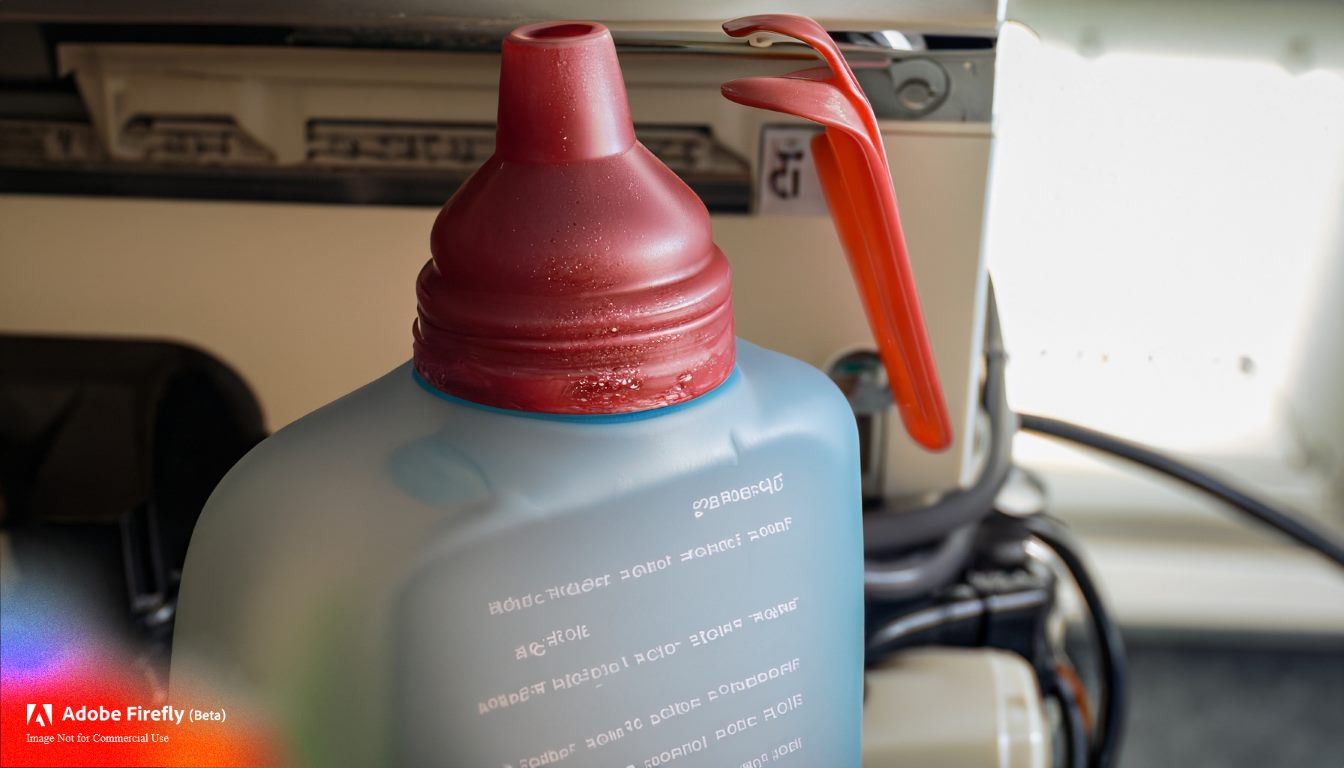If your home has an antifreeze smell, it could be coming from your furnace. If this is the case, you may need to have your furnace serviced or replaced. Other potential sources of an antifreeze smell include a car that’s been parked in your garage, or a leaky radiator.
To find the source of the smell and eliminate it, start by checking all potential sources of antifreeze one by one.
If you’ve ever smelled antifreeze in your house, it can be a bit of a mystery. Where is the smell coming from? And how do you get rid of it?
The first thing to do if you smell antifreeze in your house is to identify the source. If you have any open containers of antifreeze, such as in your garage or under your sink, make sure to tightly seal them. If there are any leaks, clean them up immediately and dispose of the antifreeze properly.
Once you’ve identified and sealed any potential sources of the smell, it’s time to ventilation. Open all the windows and doors in your house to let fresh air circulate. You may also want to consider running a fan or two to help move the air around.
If the smell persists after taking these steps, contact a professional for help. They will be able to determine if there is an hidden leak or another source of the problem that needs to be addressed.
Sudden Sweet Smell in House
If you suddenly smell something sweet in your house, it could be a gas leak. If you smell gas, open all the doors and windows to ventilate the area, then leave immediately and call the gas company. Don’t turn any lights on or off, and don’t use any appliances.
If the sweet smell is not gas, it could be coming from a piece of candy that’s been dropped under furniture or behind a appliance. Check these areas first before calling for professional help.
House Smells Like Buttered Popcorn
Sure, the smell of buttered popcorn may conjure up memories of childhood trips to the movie theater. But if your home starts smelling like a concession stand, it could be cause for alarm.There are a few possible explanations for why your house smells like buttered popcorn.
One possibility is that you have a gas leak. If you suspect this might be the case, open all the windows and doors in your home to ventilate the area and call your gas company immediately.Another possibility is that you have an electrical problem.
If your outlets or light fixtures are giving off a burning smell, it’s time to call an electrician. Don’t ignore this problem, as it could lead to a fire in your home.Finally, if neither of these explanations seem to fit, it’s possible that someone has been cooking buttered popcorn in your home without your knowledge!
If this is the case, have a talk with whoever did it and ask them to please refrain from doing so in the future. It’s not polite to cook in someone else’s home without their permission (and it can definitely make things smell bad).
Dangerous Smells in House
There are many potentially dangerous smells that can be present in a house. Some of these smells may indicate the presence of harmful chemicals or gases, while others may simply be unpleasant. Here are some of the most common dangerous smells that you should be aware of in your home:
1. Ammonia – Ammonia is a common cleaning product that can be very harmful if inhaled in large quantities. If you notice a strong ammonia smell in your home, it could be coming from a spill or leak. Inhaling too much ammonia can cause respiratory irritation and even burns.
2. Chlorine – Chlorine is often used in swimming pools to keep the water clean, but it can also be very dangerous if inhaled. A strong chlorine smell in your home could indicate that there is a leak from a nearby pool or spa. Inhaling chlorine gas can cause burning eyes, coughing, and difficulty breathing.
3. Natural Gas – Natural gas is odorless, but most utility companies add a foul-smelling chemical called mercaptan to it so that leaks can be detected more easily. If you smell anything like rotten eggs in your house, there may be a natural gas leak present. This is extremely dangerous as natural gas is highly flammable and can explode if ignited.
4. Smoke – Smoke from cigarettes, candles, fireplaces, and cooking appliances can all contain harmful chemicals that are hazardous to breathe in. Prolonged exposure to smoke can lead to respiratory problems such as asthma and bronchitis.
Metallic Smell from Air Conditioner
If your air conditioner has a metallic smell, it could be a sign of a problem with the unit. The most likely cause is that the coils inside the unit are overheating. This can happen if the unit is not properly ventilated or if there is something blocking the airflow to the coils.
If you notice this problem, you should turn off your air conditioner and call a technician to have it checked out.
Why Does My Room Smell Like Poop
Your room smells like poop because, well, there’s probably poop in it. Maybe you tracked in some on your shoes, or maybe your dog had an accident. Either way, the best way to get rid of the stink is to clean it up as soon as possible.
Soak up any solid waste with a paper towel or cloth, then disinfect the area with a solution of 1 part bleach to 10 parts water. Let it air out for a bit before you close up the room again.If the smell persists, you may need to do a more thorough cleaning.
Check for stains on carpets and walls and clean them accordingly. Launder any bedding or clothing that may be affected. And don’t forget to vacuum!

Credit: www.hunker.com
Why Does It Smell Like Coolant in My House?
If you notice a coolant smell in your house, there are a few possible explanations. First, it’s possible that your car or another vehicle is leaking coolant. If the leak is small, the coolant will evaporate quickly and you may not see any evidence of a leak.
However, if the leak is larger, you may see coolant on the ground where the vehicle was parked. If you think a vehicle may be leaking coolant, check for wetness underneath it and look for signs of an antifreeze trail leading away from the vehicle.Another possibility is that your home’s heating and cooling system uses water-based coolant (also called antifreeze) and there’s a leak in the system.
This type of system typically has a closed loop, so leaks are rare. But if there is a leak, you’ll likely see water on the floor near the furnace or air conditioner. You might also hear water dripping or gurgling noises coming from the furnace or AC unit.
If you suspect a problem with your home’s HVAC system, call a professional to have it checked out.Finally, it’s also possible that someone has deliberately poured antifreeze somewhere in your house – perhaps in an attempt to poison pets or people. If this is the case, try to determine where the odor is strongest and look for any containers that might contain antifreeze.
If you find anything suspicious, call 911 immediately and do not try to handle the situation yourself.
What Does It Mean When You Smell Antifreeze?
If you smell antifreeze, it could mean that there’s a leak in your cooling system. Antifreeze has a sweet, chemical smell, and if you notice it coming from your car, it’s important to take action right away. A leaking radiator can cause your engine to overheat, which can lead to serious damage.
If you think you may have a leak, it’s best to take your car to a mechanic so they can check for leaks and repair them before they cause any further damage.
What Does It Mean When You Smell Antifreeze Through Your Vents?
If you notice a sweet, syrupy smell coming from your car’s vents, it could be antifreeze. Antifreeze is a coolant used in vehicles to keep the engine from freezing in cold weather. If there’s a leak in your car’s cooling system, antifreeze can leak out and into the air vents.
While a small amount of antifreeze leaking into the vents may not be cause for alarm, a large leak can be dangerous.If you think you have an antifreeze leak, it’s important to have your car checked by a mechanic as soon as possible. A leaking cooling system can cause your car to overheat, which can damage the engine.
In some cases, inhaling or ingesting antifreeze can be deadly. If you notice any other strange smells or leaks coming from your car, make sure to have it checked out by a professional right away.
What Does an Ac Refrigerant Leak Smell Like?
If you have a refrigerant leak in your air conditioning unit, it will likely smell sweet or like nail polish remover. The leak itself is usually not easy to spot, but if you notice this strange smell coming from your AC unit, it’s worth investigating further.If the leak is small, you may be able to repair it yourself with a sealant kit.
But if the leak is larger, you’ll need to call in a professional to fix it. Either way, it’s important to get the leak fixed as soon as possible. Otherwise, your AC unit will continue to lose refrigerant and won’t be able to cool your home effectively.
Diagnosing Coolant Smells and Leaks Coming From Your Car, SUV or Truck
Conclusion
There’s nothing quite like the smell of antifreeze in your house. It’s a sickly sweet smell that can be hard to get rid of. If you have this problem, there are a few things you can do to try and get rid of the smell.
First, identify where the smell is coming from. This may seem like an obvious step, but it’s important to make sure that the source of the smell is actually antifreeze. Once you’ve done that, try cleaning any areas that might have antifreeze on them.
This could include spills on the floor or countertops, or drips from leaky pipes.If cleaning doesn’t work, you may need to ventilate the area to get rid of the smell. This can be done by opening windows and doors, or running a fan in the affected room.
You may also want to consider using an air purifier to help remove the odor from the air.If you’re still having trouble getting rid of the antifreeze smell, you may need to call in a professional. A plumber or HVAC technician will be able to help identify any leaks and make sure they’re repaired properly.
They can also offer advice on how best to ventilate your home and get rid of any lingering odors.
